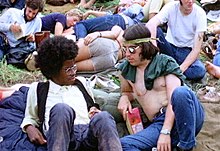Flower childoriginated as a synonym forHippie,especially among the idealistic young people who gathered inSan Franciscoand the surrounding area during theSummer of Lovein 1967. It was the custom of "flower children" to wear and distributeflowersor floral-themed decorations to symbolize ideals of universal belonging,peace,andlove.The mass media picked up on the term and used it to refer in a broad sense to any Hippie. Flower children were also associated with theflower powerpolitical movement, which originated in ideas written byAllen Ginsbergin 1965.

Origins
editThe term originated in the mid-1960s in the wake ofa film versionofH. G. Wells'sThe Time Machinethat depicted flower-bestowing, communalpeople of the futurein a story characterized by antiwar themes. American political activists likeAllen GinsbergandAbbie Hoffmanadvocated the giving of flowers as a means of peaceful protest.[1][2][3]Images of flower-wielding protesters at the 1967 Pentagon March, such asMarc Riboud's image of Jan Rose Kasmir titledThe Ultimate Confrontation: The Flower and the Bayonet[4]andBernie Boston's Pulitzer Prize–nominated photographFlower Power,[5]popularized the association of flowers with the counterculture movement of the 1970s.Hippiesembraced the symbolism by dressing in clothing with embroidered flowers and vibrant colors, wearing flowers in their hair, and distributing flowers to the public, becoming known as flower children.[6]
San Francisco
editJohn PhillipsofThe Mamas & the Papaswrote the song "San Francisco (Be Sure to Wear Flowers in Your Hair)"for his friendScott McKenzieto promote theMonterey Pop Festivalthat Phillips was helping to organize.[7]Released on May 13, 1967, the song's lyrics urged visitors toSan Franciscoto "wear some flowers in your hair", in keeping with the festival's billing as "three days of music, love, and flowers". The song was a popular hit, reaching number 4 on the music chart in the United States and number 1 in the United Kingdom and most of Europe,[8][9]and became an unofficialanthemfor hippies,flower powerand the flower child concept.[10]
Summer of Love
editAfter the January 14, 1967Human Be-Inorganized by artistMichael Bowen(among other things, announcements told participants to bring flowers), as many as 100,000 young people from all over the world flocked to San Francisco'sHaight-Ashburydistrict,Berkeley,and otherBay Areacities during theSummer of Lovein search of different value systems and experiences.[11][12]After theMonterey Pop Festivalin June of 1967, the Summer of Love became a watershed event in the development of a worldwide1960s counterculturewhen newly recruited flower children returned home at the end of the summer, taking with them new styles, ideas, and behaviors and introducing them in all major cities of the U.S. and western Europe.
Social analysis
editIn his book,Prometheus Rising,the philosopherRobert Anton Wilsonsuggested that the flower children could be viewed inJungianterms as a collective social symbol representing the mood of friendly weakness.[13]In 1995,The Sekhmet Hypothesisextended Wilson's idea into other pop cultural trends with other youth movements being compared to the moods of hostile weakness, friendly strength and hostile strength.[14]
See also
editReferences
edit- ^"Allen Ginsberg",American Masters, Public Broadcasting System, pbs.org, retrieved 30-04-2009
- ^"Guide to the Allen Ginsberg Papers: Biography/Administrative History"(PDF).The Online Archive of California.Stanford University. 1997. p. 3.Retrieved2011-09-21.
- ^Tony Perry,"Poet Allen Ginsberg Dies at 70",Los Angeles Times,April 06, 1997
- ^Curry, Andrew (April 2004)."Flower Child".Smithsonian Magazine.Archived fromthe originalon 2013-03-24.Retrieved2014-01-13.
- ^Bernie Boston,"Flower Power",The Washington Evening Star,October 21, 1967
- ^Rennay Craats,History of the 1970s,Weigl Publishers, 2001, p. 36.ISBN1-930954-29-8.
- ^Eddi Fiegel (2006).Dream a Little Dream of Me: The Life of 'Mama' Cass Elliot.pp. 225–226.ISBN9780330487511.Retrieved5 August2013.
- ^"U.K. Number Ones 1960-69".Rockmine Archives.Archived fromthe originalon 2006-05-07.Retrieved2006-06-21.
- ^Whitburn, Joel(2004).The Billboard Book of Top 40 Hits: Eighth Edition.Record Research. p. 415.
- ^McClellan, Dennis (August 21, 2012)."Scott McKenzie dies at 73".Los Angeles Times.Retrieved13 January2014.
- ^Gene Anthony (1980).The Summer of Love: Haight-Ashbury at Its Highest(PDF).ISBN0867194219.Archived fromthe original(PDF)on June 6, 2007.
- ^"Allen Cohen".Archived fromthe originalon 2003-03-01.Retrieved2003-03-01.
- ^Wilson, Robert Anton (1983).Prometheus Rising.Falcon Press. p.55.ISBN9781561840564.'She/He is self-critical, shy, timid, easily led, "spineless," and always looking for somebody to Take Charge and Give Orders. The unearthly Angel, or in modern symbolism, the Flower Child'.
- ^Spence, Iain (2012).The Hare Hypothesis.Bast's Blend.ASINB009E2YUJM.